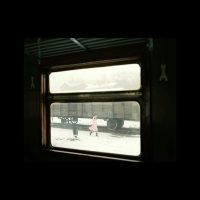A signal from a small mirror reached us from the top window of the red thick brick building. Despite the sunny clear day, the flash of reflection revealed her presence there.
I titled the image ” Anne’s signal” This is a piece about my naive way to re-enact a character of a girl, who hid in the attic during teh WWII, 60 years ago. We can’t mistakenly see the image just as a documentation of the activity, but as a fictional/non-fictional narrative that interweaves with the history of the past.
In “Departed” the same small open palm on the other side of the reflection from the window is waving to the departing train without a word or a scream; from the dark carriage her figure might not be seen, even in her bright pink dress.
A piece from Latvia with a girl mourning the event of the war between Russia and Japan. The snow covered bunker ruin in the sea stands for the ignition of the battle in 1904. The fragile flower in her hand is yet another signal.
The word, “girlhood”(innocence) can explain the meaning of these images, because of her pure obsession to understand the real facts. By denying the consumption of information and concepts, carefully perceive how to reveal. for example, a single grain underneath the cloth.
For me, the material of time works very flexible because of my wish to deconstruct the history and the moment for myself. Even a puff of smoke connects to my memories and the locations familiar from my childhood.
Photography captures the surface. However, paradoxically, I want my images to portray the sensetive point that is buried below the surface of time. I use photography to access history, to bring it to the fore. There is a power to connect the viewer with my underlying thought by experiencing the moments on these photographs.
As I was visiting the places, I was experiencing what I missed in Japan, what we have lost in the past and what we don’t own anymore because of the contemporary consumerism. The history of Japan has been disguised and kept as in the past. It was a special journey and I feel great nostalgy. Yuri Mitsuda
